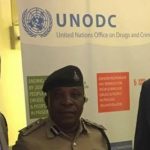Drug Law Reform: An Interview with Former NSW DPP Nicholas Cowdery

On 2 June 2011, the Global Commission on Drug Policy declared, “The global war on drugs has failed.” In its report, the commission found that prohibition has led to increased drug consumption, the growth of powerful crime networks and contributed to mass incarceration.
In the wake of these outcomes – which originated from the 1961 UN Single Convention on Narcotic Drugs and US-led drug war launched by president Nixon in 1971 – the report states that “fundamental reforms in national and global drug control policies are urgently needed.”
Significantly, those making up the panel of commissioners calling on governments around the world to experiment with the “legal regulation of drugs”, are prominent world leaders and intellectuals.
Former UN secretary general Kofi Annan is a member of the panel. Former US secretary of state George Shultz is also a member. And the former heads of state of Poland, Brazil, Colombia, Chile, Portugal, Greece and Mexico are in agreement that there should be an end to the current system of drug prohibition.
The Portuguese model
In July 2001, Portugal decriminalised the use and possession of all illicit substances. Prior to this, one percent of the Portuguese population was heroin dependant and the nation had the highest number of drug-related AIDS deaths in the European Union.
Sixteen years on, things have markedly improved. The current drug-induced death rate in Portugal sits at three per million residents, which is one-fifth of the European average. Drug-related HIV infections dropped to just 40 in 2014, compared with 1,016 in 2001.
The nation’s drug policy has been such a success that the conservative International Narcotics Control Board lauded it as exemplary in December 2015.
However, the Portuguese model does little to address the issues surrounding the supply side of illegal drugs.
The Green Rush in Colorado
The laws relating to cannabis use in the US state of Colorado have addressed the criminal side of drug supply by establishing a regulated market.
On 6 November 2012, Colorado and Washington became the first US states to legalise the recreational use of cannabis.
Today, Colorado’s legal cannabis market is a billion dollar a year industry. Last year alone, it generated $198.5 million in tax revenue. Most of this money is being funnelled into public health programs and schools.
According to state officials, the ready availability of the drug has had no overall adverse effects since it began being sold in retail stores in 2014. The cannabis market is heavily regulated, and the products are sold in childproof containers.
Calls of top Australian officials
In March this year, the independent policy think tank Australia 21 released its third report on illicit drugs in five years.
The report makes 13 recommendations regarding the decriminalisation of drugs, including “incrementally moving psychoactive drugs from the black market to the ‘white’ market.”
Many of the report’s contributors were former senior law enforcement and law officials. They included ex-police commissioners and heads of corrective services, as well as former NSW Director of Public Prosecutions (DPP) Nicholas Cowdery.
Mr Cowdery severed as the state’s DPP for 16 and a half years, as well as being a member of the NSW Sentencing Council for 13 years.
Sydney Criminal Lawyers® spoke with Mr Cowdery about the need for drug law reform in this country.
On 23 August this year, the NSW Court of Appeal ruled in the case Robertson versus R that it’s open for a judge to impose a non-custodial sentence for a significant drug supply, despite the absence of “exceptional circumstances.”
It overturned a precedent followed by the state’s courts that was set by the 1990 case R v Peter Michael Clark, which determined that unless there are exceptional circumstances, a person convicted of a substantial drug supply must be sentenced to full-time imprisonment.
In your opinion Mr Cowdery, what are the implications of the Robertson decision? And does it show a change in attitude from members of the NSW judiciary when it comes to punishment and illicit substances?
The main implication of the decision is that sentencing judges are not to act on the basis that a sentencing principle of some kind has been set in case law that a person convicted of in drugs to a substantial degree requires the imposition of full-time imprisonment, absent exceptional circumstances.
It reinforces the existence of and the need to apply in all cases the discretion that attaches to sentencers to tailor the sentence to the offence and the offender in accordance with existing legislation and case law.
Views expressed by individual judges in individual cases do not, ipso facto, create binding general principles; but guidance may still be obtained by reference to past sentencing decisions.
The decision goes back to first principles and after analysis restates the true legal position more precisely.
I do not consider that it shows a change of attitude by the bench to punishment for drug crimes. At paragraph 105 Simpson JA said: “…it is likely that this [using the yardstick derived from past sentencing decisions] will result in a conclusion that (absent some unusual circumstance) a sentence of imprisonment ought to be imposed.” But there will be exceptions and judges should not disregard all available sentencing options. So rather than the decision being a softening of judicial approach, it is a correction of a previously wrong approach that opens up future possibilities.
It should be noted that Robertson ended up with a sentence of imprisonment, although it was suspended.
You’ve been a participant in the Australia 21 think tank for some years now. Its latest report on illicit substances makes recommendations regarding the decriminalisation of drugs.
Amongst those who produced the report were eleven former senior law enforcement and law officials.
Does this changing attitude towards the way illegal drugs are approached carry over into the culture of those currently serving in the departments that these people used to be in charge of?
I believe it does, but not universally. Those agencies have – and have probably had for a long time – a proportion of people who share the views the Australia 21 reports express. I think the proportion may be increasing over time.
The problem is that while personal views may be aligned that way and even the culture of the organisations may be influenced that way, translating that into significant sympathetic action, contrary to government policy and legislation, is fraught.
Public servants are obliged to serve the government, as well as the community.
You’re the former NSW Director of Public Prosecutions and you were also a member of the NSW Sentencing Council. You first became involved in drug crime, when working for the Commonwealth back in 1968.
In your time dealing with the legal system, how would you say the laws surrounding illicit drugs have changed?
In some respects they have become more harsh (eg. section 12 of the Drug Misuse and Trafficking Act) and in others more lenient (eg. cannabis cautioning schemes).
Penalties for commercial trafficking have become harsher in both legislation and sentencing decisions, but without much deterrent effect – drugs generally now, after the so-called “war on drugs”, are more plentiful, purer, cheaper and easier to get than ever.
What effect does the current system of drug prohibition have on society?
It criminalises low level drug users whose issues should be approached on a health and social basis. It puts them at risk of consuming harmful substances which causes disease and death.
It contributes to official corruption because of the criminal profits able to be made in dealing with illicit substances. It enriches criminals.
It costs the community huge amounts in law enforcement that can only ever have a very temporary and localised effect.
What is the alternative to drug prohibition that you’re advocating for?
There has always been and there will always be a demand for drugs. The motivation varies – to relax, to drop out, to be sociable, to escape, to party – but some people in some places will always look for mood altering drugs.
Legal examples are alcohol and nicotine. The most commonly consumed illicit drug is cannabis (more is spent on it in Australia than on table wine, according to the ABS).
While there is demand, there will be supply. People will be prepared to take risks to supply illegal substances for the high profit that can be made to compensate for that risk. That is the enrichment of criminals.
I advocate for a system of regulation (by law) of the growth and production, distribution, supply, possession and use of all drugs, with a tax imposed on those profiting commercially.
There would need to be different regimes in place for different drugs; for example, cannabis could be made available at dedicated stores (as in Colorado and Washington in the USA) or pharmacies (as in Uruguay); heroin could be available on prescription under medical supervision (with appropriate support and referral services available).
Even “ice” could be managed this way (it’s not quite the bogey that it is made out to be – although it does certainly cause problems).
Licences to be involved in the trade would be difficult to obtain and easy to lose. Tax collected in the process could be dedicated to drug services of various kinds (addiction treatment, health programs, education, etc).
There would be restrictions on age, packaging, quantities, advertising, etc – perhaps as with tobacco now. Price would be commercially determined.
Anyone choosing to operate outside the regulated system would remain liable to the same sort of criminal sanctions that presently apply. Hopefully they would find it uncompetitive to be involved.
In the meantime, I support decriminalisation of drug use and possession as in Portugal. It has been working well there for many years.
The NSW prisoner population is at an all-time high. This is despite the state’s crime rates being at a 40 year low. The NSW government’s approach to the situation is to invest in more prisons.
Why is this state’s prison system overflowing, whilst crime is decreasing? And what sort of approach would you recommend be taken?
It is a “wicked” problem and a multifaceted one. In recent years the increase in prisoner numbers has been a product of: tighter bail laws; more proactive policing; more frequent sentences of imprisonment; longer sentences of imprisonment; increasing proportions of Indigenous prisoners.
I would recommend revisiting the Bail Act (again), broadening community sentencing options statewide, increasing rehabilitation and reform programs in prison and post-release, abolishing sentences of 6 months or less, expanding justice reinvestment programs in Aboriginal communities, breaking the cycle of traffic offence/fine/disqualification for non-payment/offending/imprisonment which is pernicious in rural areas.
And breaking away from the discredited notion that heavier penalties deter offenders. And legalising drugs!
And lastly, Mr Cowdery, there are significant voices in the community calling for a change in approach to illicit substances. However, there doesn’t seem to be any strong voices in parliament.
In your opinion, what’s going to bring about meaningful change to Australia’s approach to illegal drugs? And do you think it’s likely this will happen anytime soon?
I think the politicians – who must be involved in reform because it requires legislation – will act only when they deem it “safe” to do so. They are terrified of losing electoral support by being attacked by the shock jocks and tabloid media if they act “smart” on drugs. They are (generally speaking) followers, not leaders.
So through community education we must create the climate of confidence for our representatives – show them that we support change. I think the unstoppable and very substantial changes now occurring internationally will assist in this process, but it will take more time.
In the meantime, likeminded people in the community will continue the campaign for sensible reform.







